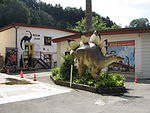Uster

Uster (High Alemannic: Uschter) is a town and the capital of the Uster District in the Swiss canton of Zürich. The importance of the town of Uster has grown considerably with the construction of the S-Bahn network of the Zurich Transport Network. With over 36,000 inhabitants, it is the third largest town in the canton and is one of the twenty largest towns in Switzerland. Along with Wetzikon, it forms one of the two centres of the Zurich Oberland. Uster is located next to a lake, called Greifensee. The official language of Uster is (the Swiss variety of Standard) German, but the main spoken language is the local variant of the Alemannic Swiss German dialect. The town of Uster received the Wakker Prize in 2001.
Excerpt from the Wikipedia article Uster (License: CC BY-SA 3.0, Authors, Images).Uster
Gerichtsstrasse,
Geographical coordinates (GPS) Address Website Nearby Places Show on map
Geographical coordinates (GPS)
| Latitude | Longitude |
|---|---|
| N 47.35 ° | E 8.7166666666667 ° |
Address
Coop Vitality (Coop Vitality Uster)
Gerichtsstrasse 4
8610 , Kirchuster
Zurich, Switzerland
Open on Google Maps










